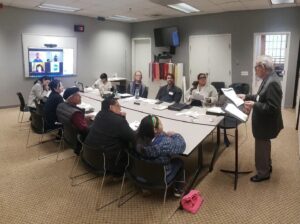Lukas Luna
Metropolis comics first opened its doors in the 1990s, back when comics like X-men sold over 8 million units—sales that have yet to be matched. 30 years later, the store has weathered a move to Bellflower Boulevard and changing market trends. But with a primal love for the heroes and villains that have inspired fans the world over, the store persists.
Current manager Michael Rice took over the store in 2012 and was immediately
faced with a conundrum: the characters headlining blockbuster film franchises like The Avengers, whose first iteration has grossed over 1.5 billion worldwide, were nowhere to be found in the comics that bore their name.
“Business has been really big, but not necessarily due to the movies,” Rice recalls. “During that time, people would come in and want to see the Avengers that they saw on screen.”
“This was during the Marvel Now era,” he says, referring to the comic publisher’s 2012 push to emphasize diversity within their books by having a number of popular heroes pass on their mantles and monikers to a new, more diverse generation.
“The Avengers were Riri Williams [the young, black female inventor featured in the latest “Black Panther”] as Iron Man, Lady Thor, Amadeus Cho as Hulk…” Rice said, listing characters that were introduced in favor of a more inclusionary catalog.
“So all these potential customers were confused because they wanted the avengers from the movies in the books.”
Without a supply of new customers, and in spite of the enormous popularity of various film franchises, Rice says comic book sales have been static since he took over the shop.
“The floppies [single issue new comic books] have always been the backbone. They’ve been pretty flat for the last few years, saleswise, [but] there’s a dedicated sect of the population that is always going to support DC, Marvel,” Rice said. “But rent, inflation, and product costs are going up every year.”
Like nearly every other comic shop nowadays, the store has had to expand its inventory beyond the titular books to make ends meet. Customers walking through the door are bombarded by memorabilia from nearly every corner of geekdom.
“There’s no more old school, purely floppy comic shops. You just can’t sustain that model, too many people have too many different interests,” Rice said. “We’ve always carried graphic novels, toys, and shirts, but they’ve now taken up much more of the store.”
While market trends are always a concern for businessmen like Rice, from his perspective, the biggest threat to his store increasingly seems to be the apathy (or even outright antagonism) from industry titans like DC and Marvel, the big two of the comic industry, towards their longtime customers.
In an early lightning rod of the debate that would soon subsume the comic reading world, David Gabriel, vice president of sales at Marvel, made headlines after stating “people didn’t want anymore diversity.” While meant as an objective analysis of the market, it proved to only fuel the flames of the coming consumer vs company controversy.
Perhaps the most infamous instance of this kind of dispute came at the hands of Mark Waid. The comic book writing veteran of both Marvel and DC’s casual use of loaded phrases would eventually land him in court.
Grassroots critic Richard C. Meyer would quickly establish himself as one of Waid’s biggest detractors. Throughout the course of the two’s tense relationship, the Marvel writer would refer to the critic as a “racist,” “serial harasser of minorities,” and “affiliated with white supremacists.”
Meyer would eventually start work on his own independent comic, the highly publicized Jawbreakers, in 2018. After seeming to find a publisher in Antarctic Press, he was dropped by the potential distributor and later assigned blame to Waid. He would fire back at his adversary with a tortious interference lawsuit that would drag on for two years before being settled out of court.
While the case is a unique and extreme one, the seeds of that conflict have informed nearly a decade of hostility between fans and creators.
“DC and Marvel both have agendas and want to be inclusive, but they insult the fans who don’t like these hastily made changes,” said Rice, referring to the backlash from decisions like an elderly Captain America granting his shield and mantle to his long time Black partner Falcon.
Tinkering with old characters would soon give rise to entirely new creations, but not before leaving many fans scratching their heads with the clumsy nature of the changes made to beloved icons. To this day, the handling of original X-Man Ice Man’s coming out has some fans questioning whether or not psychic teammate Jean Grey used her abilities to make him gay.
Then came a flood of new characters, most of whom failed to connect with fans and very quickly established that they have no desire to do so. A 2021 story which saw the 17-year-old son of Superman lambasting his father for not using his powers to enforce “better” ideals upon the world is exemplary of the first impression many of these characters left upon longtime readers.
“It seems like, nowadays, in order to make a powerful female lead, they have to step on a man’s neck. Somehow degrading this person is meant to make you a hero,” Rice said. “If you have to degrade anyone to get power, you’re not a hero, you’re a bully.”
Not all comic aficionados are in agreement on this point. Fans like LA resident Adia Haynes consider Rice’s perspective to be in bad faith.
She feels that the seeming downward sales trends are simply reflective of the times and have little to do with the handling of newer, more diverse characters.
“Comic book sales are down because not too many people are keeping up with [that] form of media,” Haynes said. “Like collecting records, it’s a dying art and only [patronized by] hipsters or those who really appreciate a printed comic book.”
Furthermore, she feels that a push for diversity is an essential step for publishers to take if they seek to weather the erosion of print mediums.
“[Diversity is] a worthwhile effort because inclusion is important.” Haynes said “Representation is a key component for success in industries in… [that] they open up more opportunities for more people to become loyal customers and fans.”
The tense environment of big time comics publishing has served to drive plenty of creatives into the independent frontier. Staking a claim in the wilds of Kickstarter and IndieGoGo, artists like Alpha Dogs and Dime Store Detective creator Jon Dexter seek to carve out their own niche away from the heat of the culture war.
“There’s a lot of divisiveness out there, now… With ‘woke’ comics, the problem is there are Republican readers, Democrat readers, and readers who just don’t care. There’s a split,” Dexter said. “There’s a tribalism, people will buy a comic now just to support their team.”
Much is made of comic sales by either side of this comic debate, but sales have proven to be fuzzy in a changing marketplace.
Far from being relegated to the racks of comic shops, graphic novels (some of which compile single issue comics into single volumes) have found their way onto the shelves of most bookstores as well as digital storefronts—well, at least back when the digital storefronts still worked.
“I have always discouraged people from looking too closely at the [month-to-month] numbers,” said John Jackson Miller, author and comic archivist, in an interview with NPR. “The comic shop market only represents a certain portion of what’s out there. The sales on a particular title or titles are not the whole picture at all.”
Adding to the confusion, sales of individual comics has been lumped in under the larger umbrella of graphic novels which includes everything from children’s books to foreign language graphic novel series. This makes it nearly impossible to get a comprehensive analysis of sales and popularity. While popular franchises fail to move product in any respectable number, graphic novel sales emphatically claim massive growth, due to overseas industries or books aimed at children.
Despite the hazy nature of sales, a cursory glance at who gets fans excited reveals the big two’s flagging fortunes.
“No one’s buying Riri Williams, no one’s buying Ms. Marvel. They’re shoving these characters down your throat, so you will think they are a hot new thing,” Rice said. “Ms. Marvel hasn’t been able to carry an ongoing series since her inception.”
Even though former industry titans suffer increasingly public and humiliating blunders, Rice says publishers and creators who haven’t lost sight of the goal post—storytelling over politics—have been rewarded with increasing success and excited fans.
This seeming drought has allowed maverick creators to achieve levels of success that previously seemed unattainable by a lone upstart. Popular scribe Mark Millar managed to leverage well regarded work at the big two into creating his own publishing house that was purchased by Netflix for 31 Million.
“People want intelligent storytelling,” Rice said. “That’s why Spawn is still around 30 years later. That’s why The Walking Dead is a global phenomenon. That’s why Mark Millar has a deal with Netflix.”
Comic book stores were never the most lucrative business, and the antics of publishers who are supposed to rely on these shops seems to speak to a suicidal industry. Despite all this, Rice and fans of his ilk remain steadfast in their fandom.
“[I have a] passion for what the industry was and can be again,” Rice said, fondly recalling the diverse ensembles of yesteryear, such as those by one of the most popular titles in the medium’s history: Chris Claremont’s “The Uncanny X-men.”
The British-born American writer shepherded the team of merry mutants from near obscurity to become a sales juggernaut during his 17-year run on the book, and his ideas are still unshakably tied to the characters 30 years later.
“There are ways to tell stories with messages. You look at Chris Claremont with the X-men. Instead of leading the horse to water and making it drink, he made you want to drink,” Rice said. “Mystique and Destiny had a loving lesbian relationship, Storm was a uniquely feminine badass. What happened to that kind of diversity?”
Despite the storm of controversy the big two have kicked up in recent years, they have proven capable of still producing that same type of quality storytelling.
“We still have the Moon Knights, the Ghost Riders, the Carnages,” he says, referring to ongoing titles that Rice enjoys and maintains good sales.
“On top of that I can discover other universes I never would have dabbled in, with manga,” he says about Japan’s popular genre of graphic storytelling. “It’s almost like discovering Batman today and realizing that you have 80 years of great stories to go back and read. There’s still so many good books to put in people’s hands, and that’s what still drives me to do this.”
Comic book fans have always dealt with a certain level of stigma, now even from within their own niche. But Rice is the purest expression of the child-like glee a fan gets from sharing something they love, and it is that love that has informed his time at Metropolis.
“These characters mean something to us, we’ve bled for them, we’ve sweat for them, we’ve gone to conventions before it was cool, before Hollywood took over. There was a way paved here, respect the way,” Rice said “As a kid, I grew up loving this stuff and want other people to love it. Why would I ever block anyone from this. This is a church, come in, be yourself, and find something you love.”
If Superman, Spider-man, or any of their ilk ever meant something to you, come pay Michael Rice a visit at 16509 Bellflower Blvd in Bellflower. He’d love to have you.





